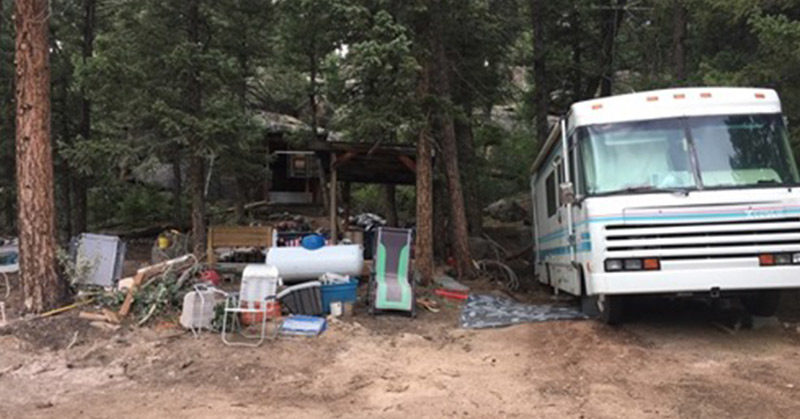In 2017, a homeless man in Conifer, Colorado, finally was able to get off the streets and live in an RV on property he purchased himself. Not long after, however, by-law officers all but kicked him off of his property. Unfortunately, his isn’t the only tale like this.
Homeless Man Kicked Off Of His Own Property
After living for six years as a homeless man, Clem Smith could finally say he had broken the cycle. (1)
After receiving a $214,000 inheritance from his mother, he was able to purchase some mountain property in Conifer, Colorado. He used what was left over after the purchase to install power connections, a water well, septic drawings and engineering, and road engineering. (1)
Her also purchased (1):
- An old front-end loader
- Dump truck
- Used car
- Shipping container
- Chicken coop with four hens
Along with all of this on his property, he also parked his RV which is also his home. All of this is temporary, as he is planning on building an actual house on the property. (1)
After a neighbor sent in a complaint about his RV, shipping container, and trash, however, that goal might be even further from his reach. (1)
Code Violations
The complaint states that Smith is using vacant property to store these items and that he was going to allow someone to live in the shipping container. This idea comes from the dresser, which Smith uses as both a workbench and for storage, that he keeps inside it. (1)
According to the county’s code, the RV and shipping container are considered accessories and can’t be parked on a property without a house. (1)
“I own this property,” Smith told Denver7. “I paid for it in cash. It’s all mine. I should be able to live on it for a certain amount of time, while I’m surveying, engineering or planning.” (1)
He was given extra time to comply with orders but faces a $500 to $1000 fine if he does not comply. This means he has to move all of his items into storage and is facing once again living in Walmart parking lots in his RV yet again. (1)
Not the Only Homeless Man This Problem
Joseph Kniss of Jefferson County, Colorado, recently experienced a similar issue. After spending a decade sleeping in dumpsters and occasional tents, this homeless man worked his way up to purchasing a mobile home. (2)
He was paying $200 per month to park his RV on someone else’s property. After two weeks of living there, he woke up to a by-law officer telling him that he was breaking code and was not allowed to be parked there. (2)
“For two weeks now, I have felt like a person with a home. And now, I am being told I have to go back homeless again,” Kniss said. “I’m like, ‘Why? What am I doing wrong here? I am paying for a place. It is in unincorporated Jefferson County. The (landlord) is okay with me.’” (2)
He has been told he must find a new place to take his motor home, which he renovated and decorated himself, or face penalty. (2)
“I don’t know what else society could want from a person. I’m trying so hard to be the human being society wants me to be. And now, it is not good enough. What else does society want out of me?” (2)
County code prohibits someone from living in a mobile home on a property for more than two weeks unless they have extended-stay permits. These permits are only obtainable if you have proof you are building a home elsewhere. Either that or the property has to be zoned for that type of housing. (2)
Colorado Code
Colorado is currently working on tiny home legislation as the desire for this type of living grows. The ordnance states this:
“In layman’s terms, the aim of this legislation is to permit the use of safe and inspected tiny homes and RVs for residential use in some areas. These units must be registered by the department of motor vehicles, and if they are being used as a residence, they must obtain a CO from the Creede Building Department, which will ensure livability and appropriate inspections. They may only be used on vacant residential lots, and are only allowed as a Special Review Use in certain zones … must be hooked up to city utilities … [and] may not be used as an accessory dwelling structure on an occupied lot.” (3)
Colorado is not unique in its codes surrounding motor homes. Most states don’t allow for street parking of an RV in front of a home, instead restricting RVs to places that (4):
- Are zoned for this type of housing
- Have the necessary permits
Most of the time, this is primarily campgrounds and mobile home parks. (4) Of course, all of this only really becomes a problem if you receive a complaint from your neighbor.
If you are planning on living in a mobile home, read through the laws in your state carefully – it might not be as simple as you think.
Keep Reading: Highschool students build tiny homes to help homeless veterans
- https://www.thedenverchannel.com/news/local-news/homeless-man-being-booted-off-his-own-newly-purchased-mountain-property
- https://denver.cbslocal.com/2020/01/09/joseph-kniss-rv-jefferson-county/
- https://www.colorado.gov/pacific/sites/default/files/2-8-18%20Packet.pdf
- https://koa.com/blog/the-beginners-guide-to-buying-an-rv-laws-and-other-items/

